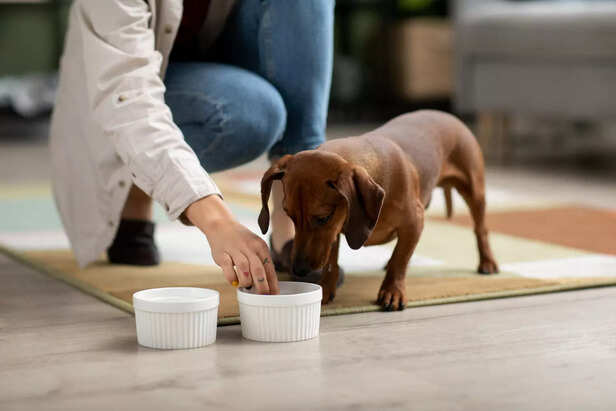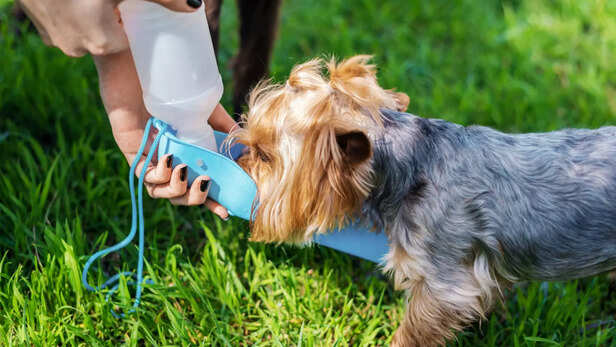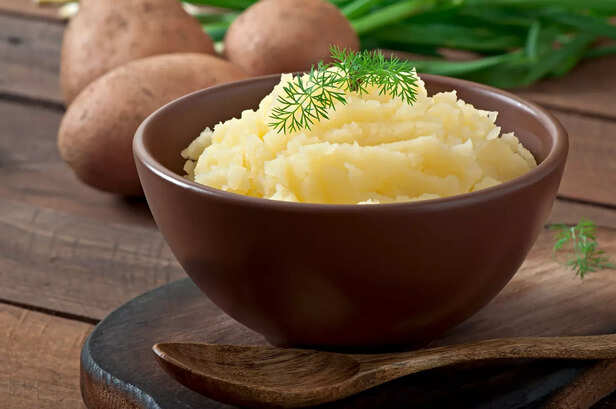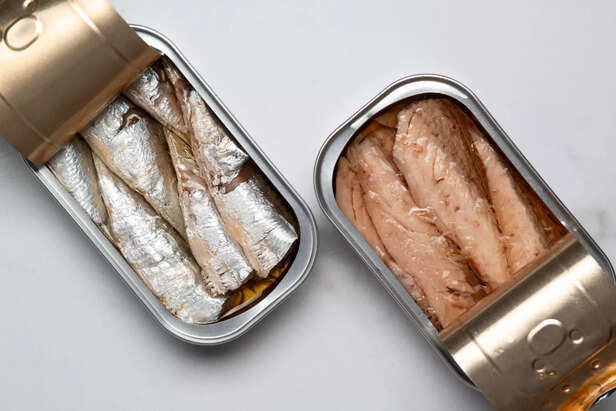What to Feed Sick Pets: A Complete Recovery Meal Guide
Nikita Kanyal | Feb 02, 2025, 22:44 IST
( Image credit : Times Pets )
Caring for a sick pet requires special attention, particularly when it comes to their diet. This comprehensive guide provides expert tips on what to feed your pet during illness, including easily digestible foods, hydration strategies, and condition-specific dietary recommendations. Learn how to stimulate appetite, avoid harmful foods, and support your furry friend\u2019s recovery with proper nutrition.
When our beloved pets fall ill, it’s natural for us to want to provide them with the best care possible. A crucial part of their recovery process is ensuring they receive the right nutrition. Feeding a sick pet can be challenging, as their appetite may decrease or they may develop dietary restrictions depending on their condition. This guide provides actionable advice to help you navigate the complexities of feeding your sick pet, ensuring they get the nourishment they need to recover quickly.
Understanding Your Pet’s Needs

Before adjusting your pet’s diet, it’s essential to consult with your veterinarian. A vet can provide a diagnosis, recommend specific foods, and guide you on portion sizes. Understanding the cause of your pet’s illness is key, as conditions like gastrointestinal upset, kidney disease, or infections require tailored dietary approaches.
Stick to Easily Digestible Foods
Sick pets often have sensitive stomachs. Opt for foods that are bland, low in fat, and easy to digest. Common options include boiled chicken, white rice, and plain, unsweetened pumpkin. These foods help soothe the stomach and provide gentle nourishment without exacerbating symptoms.
Hydration is Key

Illness can lead to dehydration, especially if your pet has diarrhea or is vomiting. Always ensure fresh water is available. For pets that are reluctant to drink, consider offering diluted chicken or beef broth (without onions or garlic) to encourage hydration.
Small, Frequent Meals
Instead of feeding large meals, offer smaller portions throughout the day. This approach is less overwhelming for a sick pet’s digestive system and can prevent nausea.
Temperature Matters
Slightly warming your pet’s food can make it more aromatic and appealing, especially for pets with diminished appetites. Be sure to test the temperature before serving to avoid burns.

For dogs, the following options are generally safe and effective:
Boiled Chicken and Rice: A classic bland diet, this combination is gentle on the stomach and provides essential proteins and carbohydrates.
Plain Scrambled Eggs: Eggs are a good source of protein and easy to digest.
Mashed Sweet Potatoes: Rich in fiber and nutrients, sweet potatoes can help with digestive issues.
Bone Broth: Homemade bone broth (free of onion, garlic, and excess salt) can be both hydrating and nutritious.
Plain Yogurt: If your dog is not lactose intolerant, yogurt can promote gut health thanks to its probiotics.

Cats can be picky eaters, especially when they’re sick. Consider these options:
Plain Boiled Chicken or Turkey: These protein-rich foods are appealing and easy to digest.
Wet Canned Cat Food: Opt for a high-quality brand that’s low in carbohydrates and rich in protein.
Tuna or Salmon (in Water): These can act as appetite stimulants but should only be given in moderation.
Chicken Broth: Similar to dogs, this can help hydrate and nourish a sick cat.
Pumpkin Puree: For cats with constipation or diarrhea, plain pumpkin puree can help regulate their digestive system.
Symptoms: Vomiting, diarrhea, or constipation.
Dietary Tips: Feed bland, low-fat diets. Rice, boiled chicken, and plain pumpkin are excellent options. Avoid dairy, fatty foods, or anything spicy.
2. Kidney Disease
Symptoms: Increased thirst, loss of appetite, or vomiting.
Dietary Tips: Focus on low-protein, low-phosphorus diets. Prescription kidney diets are often recommended. Avoid high-protein foods like red meats.
3. Infections or Fevers
Symptoms: Lethargy, reduced appetite, or fever.
Dietary Tips: Provide nutrient-dense, highly palatable foods like wet food or chicken broth to stimulate appetite.
4. Post-Surgery Recovery
Symptoms: Drowsiness, reduced activity, or nausea.
Dietary Tips: Offer small portions of easily digestible foods. Follow your vet’s instructions for introducing regular meals.
Fatty or Spicy Foods: These can upset your pet’s stomach further.
Toxic Ingredients: Never feed pets foods containing onion, garlic, chocolate, or artificial sweeteners like xylitol.
Bones or Raw Foods: While raw diets are popular, they’re not suitable for sick pets due to potential bacterial contamination.
Human Junk Food: Avoid salty snacks, sugary treats, or processed foods.
If your pet is reluctant to eat, try these strategies:
1. Hand-feed small pieces to encourage interest.
2. Add a small amount of broth or wet food to make meals more enticing.
3. Use appetite stimulants recommended by your vet.
4. Ensure the feeding environment is calm and quiet.
If your pet refuses to eat for more than 24 hours or shows worsening symptoms (e.g., severe vomiting, lethargy, or weight loss), contact your veterinarian immediately. Prolonged fasting can lead to complications like hepatic lipidosis in cats or dehydration in dogs.
Understanding Your Pet’s Needs

Understanding what your pet need ( Image Source : Pixabay)
( Image credit : Times Pets )
Before adjusting your pet’s diet, it’s essential to consult with your veterinarian. A vet can provide a diagnosis, recommend specific foods, and guide you on portion sizes. Understanding the cause of your pet’s illness is key, as conditions like gastrointestinal upset, kidney disease, or infections require tailored dietary approaches.
General Guidelines for Feeding Sick Pets
Sick pets often have sensitive stomachs. Opt for foods that are bland, low in fat, and easy to digest. Common options include boiled chicken, white rice, and plain, unsweetened pumpkin. These foods help soothe the stomach and provide gentle nourishment without exacerbating symptoms.
Hydration is Key

Keep them Hydrated ( Image Source : Pixabay)
( Image credit : Times Pets )
Illness can lead to dehydration, especially if your pet has diarrhea or is vomiting. Always ensure fresh water is available. For pets that are reluctant to drink, consider offering diluted chicken or beef broth (without onions or garlic) to encourage hydration.
Small, Frequent Meals
Instead of feeding large meals, offer smaller portions throughout the day. This approach is less overwhelming for a sick pet’s digestive system and can prevent nausea.
Temperature Matters
Slightly warming your pet’s food can make it more aromatic and appealing, especially for pets with diminished appetites. Be sure to test the temperature before serving to avoid burns.
Foods to Feed Sick Dogs

Maintaining healthy diet ( Image Source : Pixabay)
( Image credit : Times Pets )
For dogs, the following options are generally safe and effective:
Boiled Chicken and Rice: A classic bland diet, this combination is gentle on the stomach and provides essential proteins and carbohydrates.
Plain Scrambled Eggs: Eggs are a good source of protein and easy to digest.
Mashed Sweet Potatoes: Rich in fiber and nutrients, sweet potatoes can help with digestive issues.
Bone Broth: Homemade bone broth (free of onion, garlic, and excess salt) can be both hydrating and nutritious.
Plain Yogurt: If your dog is not lactose intolerant, yogurt can promote gut health thanks to its probiotics.
Foods to Feed Sick Cats

Cats need highly digestible proteins from whole meats (Image Source : Freepik)
( Image credit : Times Pets )
Cats can be picky eaters, especially when they’re sick. Consider these options:
Plain Boiled Chicken or Turkey: These protein-rich foods are appealing and easy to digest.
Wet Canned Cat Food: Opt for a high-quality brand that’s low in carbohydrates and rich in protein.
Tuna or Salmon (in Water): These can act as appetite stimulants but should only be given in moderation.
Chicken Broth: Similar to dogs, this can help hydrate and nourish a sick cat.
Pumpkin Puree: For cats with constipation or diarrhea, plain pumpkin puree can help regulate their digestive system.
Special Considerations for Common Illnesses
1. Gastrointestinal Upset
Dietary Tips: Feed bland, low-fat diets. Rice, boiled chicken, and plain pumpkin are excellent options. Avoid dairy, fatty foods, or anything spicy.
2. Kidney Disease
Dietary Tips: Focus on low-protein, low-phosphorus diets. Prescription kidney diets are often recommended. Avoid high-protein foods like red meats.
3. Infections or Fevers
Dietary Tips: Provide nutrient-dense, highly palatable foods like wet food or chicken broth to stimulate appetite.
4. Post-Surgery Recovery
Dietary Tips: Offer small portions of easily digestible foods. Follow your vet’s instructions for introducing regular meals.
What to Avoid Feeding Sick Pets
Toxic Ingredients: Never feed pets foods containing onion, garlic, chocolate, or artificial sweeteners like xylitol.
Bones or Raw Foods: While raw diets are popular, they’re not suitable for sick pets due to potential bacterial contamination.
Human Junk Food: Avoid salty snacks, sugary treats, or processed foods.
Encouraging Appetite in Sick Pets
1. Hand-feed small pieces to encourage interest.
2. Add a small amount of broth or wet food to make meals more enticing.
3. Use appetite stimulants recommended by your vet.
4. Ensure the feeding environment is calm and quiet.
